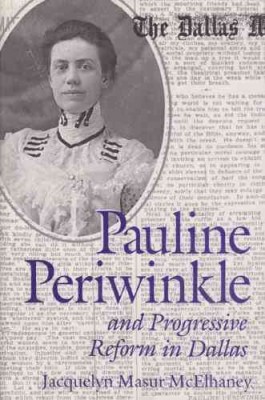| Pauline Periwinkle and Progressive Reform in Dallas: Volume 73 Contributor(s): McElhaney, Jacquelyn Masur (Author) |
|
 |
ISBN: 1623492998 ISBN-13: 9781623492991 Publisher: Texas A&M University Press OUR PRICE: $20.66 Product Type: Paperback - Other Formats Published: April 2015 |
| Additional Information |
| BISAC Categories: - Biography & Autobiography | Women - Social Science | Women's Studies - Language Arts & Disciplines | Journalism |
| Dewey: B |
| Series: Centennial Series of the Association of Former Students Texas A & M University (Hardcover) |
| Physical Information: 0.6" H x 6" W x 8.8" (0.70 lbs) 224 pages |
| Themes: - Sex & Gender - Feminine - Cultural Region - Southwest U.S. - Geographic Orientation - Texas - Cultural Region - Mid-South - Cultural Region - South |
| Descriptions, Reviews, Etc. |
| Publisher Description: In turn-of-the-century Texas, newspapers routinely offered only fashion and social news to their women readers. Pauline Periwinkle, the pen name of Isadore Miner Callaway, changed this with her weekly column for the Woman's Century Page of the Dallas Morning News which encouraged women to take part in the Progressive Era by becoming involved in reform efforts in their cities and towns. As the first woman editor for Dallas Morning News, Pauline Periwinkle was a catalyst for numerous local reforms and was widely read by women across Texas. Viewing women's clubs as an ideal vehicle for familiarizing women with the needs of their communities, she was a driving force behind the establishment of the Women's Congress, the Dallas Federation of Women's Clubs, the Equal Suffrage Club of Dallas, the Dallas Women's Forum, and the Texas Women's Press Association. In Pauline Periwinkle and Progressive Reform in Dallas, Jacquelyn Masur McElhaney weaves together the development of women journalists as reform advocates, a chronicle of Periwinkle's life describing her talents for raising public consciousness about various problems and promoting solutions, and excerpts from her remarkably intelligent and witty columns. She creates an informative and moving story of a resilient woman who expressed her opinions and views in an unforgettable manner to ageneration of Texas women who were just beginning to find a political voice. Those interested in Texas history, women's history, and history of journalism will find Periwinkle's writings, along with the author's analysis, a valuable addition to understanding how women journalists aided the cause of Progressive Era reform efforts. Periwinkle's common sense, straightforward observations, and sly sense of humor continues educating and entertaining today's reader. |